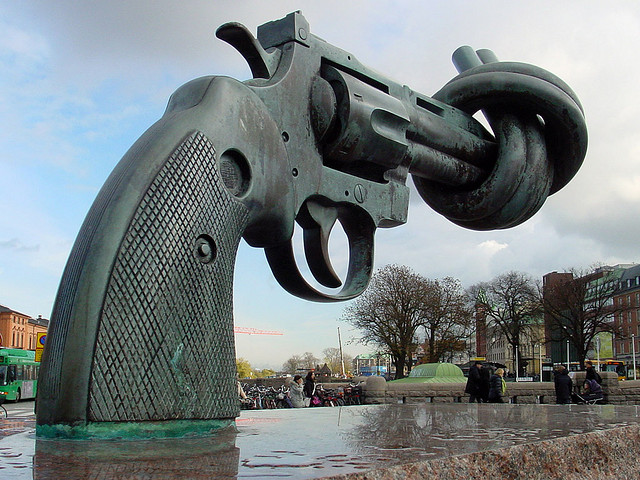by Hoai Tram Nguyen
People who know me call me a European Federalist, as I admire the way in which the EU’s foreign policy is conducted: with the long term goal of peace, democracy, rule of law, respect for human rights, sustainable development and good governance. But the truth is that the EU has two faces when it comes to its foreign policy. On the one hand, the EU is trying to promote its values in the world. On the other hand, the EU is prioritizing economic benefits over its own values. These economic benefits are particularly prominent in the arms trade business. Though limited research has been conducted within this highly sensitive field, I am convinced that exporting arms is never the road towards a stable, peaceful world. In this article I will show that several Member States (MS) have exported arms to the Middle-East, and in particular to Libya. I am therefore wondering: is the EU contradicting its own norms and values by exporting arms to conflict zones?” The arms trade is a phenomenon that I strongly oppose, as it is hypocritical and contradictory to everything the EU is standing for. One can simply not promote democracy, peace and stability in the world, while simultaneously undermining this by selling weapons.
When the civil war broke out in Libya in 2011, many refugees were stranded on Lampedusa. Italy argued it did not have the capacity to solve this problem on its own, and turned to the EU for help. The people fleeing from this civil war were on the run from Gaddafi’s violent regime. The alarming part in this story is that the weapons used against the Libyan people were manufactured in Europe and exported by EU MS. Data [1] shows that the worth of the military equipment exported to Libya by MS exceeded € 900 million prior to the civil war (2005-2010). In particular, Italy exported more than € 300 million worth of arms to Gaddafi’s regime, including bombs, torpedoes, rockets, missiles, rifles, military vehicles and so on. This is the same country that turned to the EU for help when it became confronted with the results of its own arms trading by being overwhelmed by Libyan refugees.
I must also stress the other side of the story; in short, all this does not mean that MS can export arms without facing difficulties. Officially, there are eight criteria set out in the Council Common Position 2008/944/CFSP that must be considered before granting export licenses of military/arms exports to a third country. The Common Position has been adopted as a politically binding tool within the CFSP, yet the CFSP still remains intergovernmental – making it non legally binding. Research conducted by Hansen & Marsh (2015) shows that many MS did not take these criteria into account in the case of Libya, resulting in a high volume of arms exports. I would like to emphasize three of the eight criteria:
- Respect for human rights conditions in the country of final destination as well as respect by that country of international humanitarian law;
According to Amnesty International, human rights conditions in Libya were consistently violated by the regime. These reports warned that small arms and military vehicles could be used for internal repressions. Hansen & Marsh’s research shows that the UK exported military vehicles nonetheless, ignoring the reports. Hence, if you have seen photos in the headlines of vehicles patrolling the streets in Libya during the uprising in 2011, you know where they might have come from. Also, the New York Times reported that cluster munitions from Spain were used against civilians in Misrata by the regime.
2. Existence of a risk that the military technology or equipment will be diverted with the buyer country or re-exported under undesirable conditions;
In relation to the redistribution of arms, MS should have abstained from exporting arms to the Gaddafi regime. The past has shown that the regime has re-exported these under undesirable conditions to, amongst others, Senegal, Sudan, Sierra Leone and many more.
3. Preservation of regional peace, security, and stability.
This criterion should have clearly prevented arms exports to Libya as there was a serious threat of instability. Gaddafi’s regime had not shown itself to be a responsible partner to trade arms with, as it had been in conflict with several of its neighbors: it supported military coups in Ghana, and had several territorial disputes with Niger, Algeria, and Tunisia.
In sum, taking the above mentioned points, one can conclude that the EU must put more pressure on its MS to refrain from exporting arms. Even if there is only a slight doubt that the arms will be re-distributed in the wrong hands, MS should not export them. Especially if we look at the situation in the Middle East now. Libya was just an example, but for all we know, there is a possibility that ISIS is fighting with weapons manufactured by EU countries. However, it is important to note that EU countries are not the only arms exporters in the world. As a matter of fact, next to France, the UK and Germany, the countries with the largest arms industries are China, the USA, and Russia. Five of these countries are Permanent Members in the UN Security Council to “maintain international peace and security”. Ironic, isn’t it?
To a certain extent, the EU has contributed to regional instability, increased the levels of armed conflicts, and failed to preserve peace. Thus, regarding the current situation in the Middle East, it can be concluded that the EU has been acting in a hypocritical way by exporting arms, knowing that the consequences will go against its own values. War and conflict can be a great business for countries with big arms industries as they can profit from these “ideal-suited-situations”, a phenomenon that prevails over values for peace. But if we want to have sustainable peace in the world, I urge all arms-exporting countries in the world to stop exporting!




